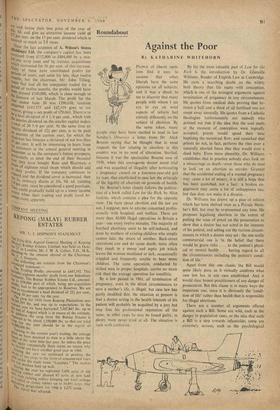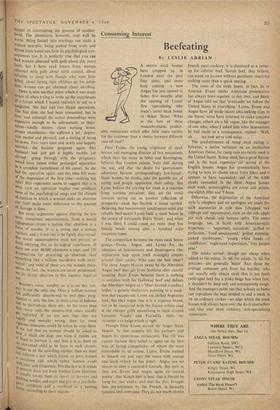Roundabout
Against the Poor
By KATHARINE WHITEHORN
PEOPLE of liberal opin- ions find it easy to pregnancy caused on a fourteen-year-old girl by rape, that established in case law the principle of the legality of abortion on grounds of health.
Dr. Bourne's letter closely follows the publica- tion of a book called Law for the Rich, by Alice Jenkins, which contains a plea for the opposite view. The facts about abortion and the law are not, I suppose, new to anyone concerned profes- sionally with hospitals and welfare. There are more than 40,000 illegal operations in Britain a year—one every twelve minutes. The majority of botched abortions seem to be self-induced, and done by mothers of existing children who simply cannot take the strain of another. Back-street operations can and do cause death; more often they result in a messy and septic job which leaves the woman mutilated or sick, occasionally crippled and frequently unable to bear more children. The same operation, conducted by skilled men in proper hospitals, carries no more risk than the average operation for tonsillitis.
By a law passed in 1861, all termination of pregnancy, even in the direst circumstances to save a mother's life, is illegal; but case law has partly modified this; the situation at present is that a doctor acting in the health interests of his patient will probably be acquitted by a jury but may lose his professional reputation all the same; in other cases he may be found guilty, in plenty more never tried at all. The situation is rank with confusion. By far the most valuable part of Law for the Rich is the introduction by Dr. Glanville Williams, Reader of English Law at Cambridge. He casts a searching doubt on the widely held theory that life starts with conception, which is one of the strongest arguments against termination of pregnancy in any circumstances. He quotes from medical data proving that be- tween a half and a third of all fertilised ova are swept away naturally. He quotes from a Catholic theologian (unfortunately not named) who pointed out that if the idea that the soul starts at the moment of conception were logically accepted, priests would spend their time baptising the menstrual flow; and remarked that priests do not, in fact, perform the rites over a naturally aborted foetus that they would over a dead baby. Even more plausibly. Dr. Williams establishes that in practice nobody does look on a miscarriage as death--even those who do tend to look on an abortion as murder. Granted that the accidental ending of a wanted pregnancy may cause a lot of misery, it is still a hope that has been quenched, not a fact : a broken en- gagement may cause a lot of unhappiness too, but that does not make it a divorce.
Dr. Williams has drawn up a plan of reform which has been shelved once as a Private Mem. ber's Bill, but may be re-presented any time. He proposes legalising abortion to the extent of putting the onus of proof on the prosecution to show that a doctor has not acted in the interests of his patient, and setting out the various circum- stances in which a doctor may act : the one really controversial one is 'in the belief that there would be grave risks . . . to the patient's physi- cal or mental health . . . having regard to all the circumstances including the patient's condi- tion of life.'
Apart from this one clause, the Bill would quite likely pass, as it virtually confirms what case law has in any case established. And it would clear honest practitioners of any danger of prosecution. But this clause is in many ways the important one, since it is Obviously the 'condi- tion of life' rather than health that is responsible for illegal abortions.
There are a number of arguments offered against such a Bill. Some are wild, such as the danger to population rates, or the idea that such a Bill is a step towards infanticide; some are extremely serious, such as the psychological Till SPECTATOR, NOVEMBER 4 I danger of interrupting the process of mother- hood. The alternative, however, may well be worse. Being forced into marriage can make a woman neurotic; being sacked from work and driven froM home can haVe its psychological con- sequences trio. It is perfectly true that you can find women obsessed with guilt about this years later; but I have read letters from women obsessed with guilt about birth control, about refusing to sleep with fiances who were later killed, about letting their children go for adop- tion; women can get obsessed about anything.
There is also another point which I was made aware of when trying to write up the experiences of a friend which I hoped (naively) to sell to a magazine. She had had two illegal operations. The first time she had been unmarried. but in love; and although the actual proceedings were exPensiVe enough to be untraumatic in them- selves—kindly doctor, clean nursing home. PrOPer anwsthetics—she suffered a lot: depres- sion mental and physical, and a feeling of being let down. Two years later and newly and happily Married, she became pregnant again. Her husband had just got a highly mobile job abroad: going through with the pregnancy Would have meant either prolonged separation of a complete curtailment of his career. So she had the operation again. and this time felt one of the depression of the first time—nothing but relief Her experience seems to suggest that it is what such an operation implies that produces some of the psYchological snags and the climate of opinion in which a woman seeks an abortion can itself make some difference to the amount of damage it does.
But many arguments against altering the law 'tent, sometimes unconsciously, from a moral repugnance--from a feeling that ..abortion is a form of murder. It is a strong and a serious °Pinion. and it is not one to be lightly discounted But moral squeamishness must not prevent us from carrying this to its logical conclusion. If there are over 40,000 abortions a year, and 150. Proseeutions for procuring an abortion. then • something like a million murderers walk unde- tecled---and most of these are the women them- selves. In faet, the women are never prosecuted: we (10 accept abortion in this country. legal or not.
Bourne s voice, weighty as it. is on this sub iect• is not the only one Over a million women felt sufficiently determined to end their preg- nancies to defy the law, in most cases at. hideouS risk to themselves; there mas he far more than 'gat, since only. the unsuccessful cases usually Pet reported. If we are sure that they are regally - and morally wrong, then far more r ,1,8°r0115 measures could be taken to stop them. we feel that no woman should be asked to ear a child she does not want if means are at a . hand to prevent it, and that it is as hard on stl r •unwanted child to be born in such eircum- ._ances as on the unwilling mother, then we must ot tolerate a law which forces on poor women all _ revolting risk which richer women evade ill) ease and frequency.. For the law as it stands It present does not keep women from abortion. t s;rn. PlY forces them to resort to skewers and i.,e,,King needles and ergot and gin: or a psycholo- frs certificate and a weekend in a nursing onie• according to their station.















































 Previous page
Previous page